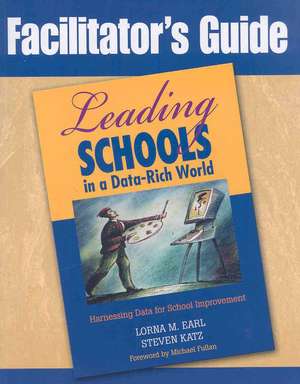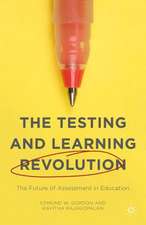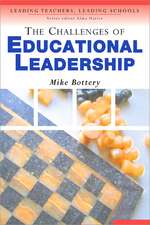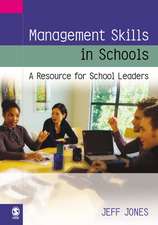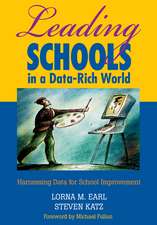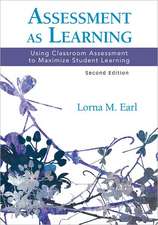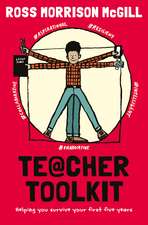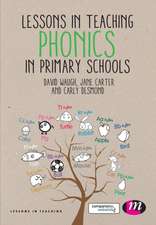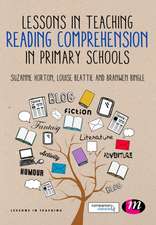Facilitator's Guide to Leading Schools in a Data-Rich World: Harnessing Data for School Improvement
Autor Lorna M. Earl, Steven Katz, Sonia Ben Jaafaren Limba Engleză Paperback – 3 dec 2007
Preț: 140.96 lei
Nou
Puncte Express: 211
Preț estimativ în valută:
26.97€ • 28.29$ • 22.45£
26.97€ • 28.29$ • 22.45£
Carte tipărită la comandă
Livrare economică 01-15 aprilie
Preluare comenzi: 021 569.72.76
Specificații
ISBN-13: 9781412955126
ISBN-10: 1412955122
Pagini: 64
Dimensiuni: 216 x 279 x 4 mm
Greutate: 0.2 kg
Ediția:1
Editura: SAGE Publications
Colecția Corwin
Locul publicării:Thousand Oaks, United States
ISBN-10: 1412955122
Pagini: 64
Dimensiuni: 216 x 279 x 4 mm
Greutate: 0.2 kg
Ediția:1
Editura: SAGE Publications
Colecția Corwin
Locul publicării:Thousand Oaks, United States
Cuprins
About the Authors
Introduction
How to Use This Guide
Suggested Timeline for Workshop Schedule
Overview of the Book
Additional Resources for Facilitators
Chapter-by-Chapter Study Guide: Facilitator's Guide to Leading Schools in a Data-Rich World: Harnessing Data for School Improvement by Lorna M. Earl and Steven Katz
Segment 1: What Do You Believe About Your School?
Chapter 1. Putting Data at the Center of School Improvement
Segment 2: Capacities for Using Data for Decision Making
Chapter 2. Using Data for Informed Decision Making
Chapter 3. Cultivating the Qualities of Data-Driven Leadership
Segment 3: What Is the Context and Direction of This Inquiry?
Chapter 4. Developing an Inquiry Habit of Mind
Segment 4: What Are the Data and Questions for This Inquiry?
Chapter 5. Becoming Data Literate
Segment 5: How Do We Make Sense of the Data?
Chapter 5. Becoming Data Literate
Chapter 6. Creating a Culture of Inquiry
Segment 6: How Do We Do Something About What We Find?
Chapter 6. Creating a Culture of Inquiry
Segment 7: Sustaining the Process
Chapter 7. Sustaining the Process: The Cycle of Inquiry
Handouts
Handout 1. Metaphor Reflection Activity Sheet
Handout 2. Initial Environmental Scan Activity Sheet: Part 1
Handout 3. Initial Environmental Scan Activity Sheet: Part 2
Handout 4. Selecting Your Colors Activity Sheet
Handout 5. Block the Canvas: From Indicator Categories to Questions Activity Sheet
Handout 6. Block the Canvas: From Questions to Data Sources Activity Sheet
Handout 7. Data Quality Activity Sheet
Handout 8. Questions About Data Quality Activity Sheet
Handout 9. Interpreting the Individual Data Sources Activity Sheet
Handout 10. Consensus About Interpretations Activity Sheet
Workshop Evaluation Form
Introduction
How to Use This Guide
Suggested Timeline for Workshop Schedule
Overview of the Book
Additional Resources for Facilitators
Chapter-by-Chapter Study Guide: Facilitator's Guide to Leading Schools in a Data-Rich World: Harnessing Data for School Improvement by Lorna M. Earl and Steven Katz
Segment 1: What Do You Believe About Your School?
Chapter 1. Putting Data at the Center of School Improvement
Segment 2: Capacities for Using Data for Decision Making
Chapter 2. Using Data for Informed Decision Making
Chapter 3. Cultivating the Qualities of Data-Driven Leadership
Segment 3: What Is the Context and Direction of This Inquiry?
Chapter 4. Developing an Inquiry Habit of Mind
Segment 4: What Are the Data and Questions for This Inquiry?
Chapter 5. Becoming Data Literate
Segment 5: How Do We Make Sense of the Data?
Chapter 5. Becoming Data Literate
Chapter 6. Creating a Culture of Inquiry
Segment 6: How Do We Do Something About What We Find?
Chapter 6. Creating a Culture of Inquiry
Segment 7: Sustaining the Process
Chapter 7. Sustaining the Process: The Cycle of Inquiry
Handouts
Handout 1. Metaphor Reflection Activity Sheet
Handout 2. Initial Environmental Scan Activity Sheet: Part 1
Handout 3. Initial Environmental Scan Activity Sheet: Part 2
Handout 4. Selecting Your Colors Activity Sheet
Handout 5. Block the Canvas: From Indicator Categories to Questions Activity Sheet
Handout 6. Block the Canvas: From Questions to Data Sources Activity Sheet
Handout 7. Data Quality Activity Sheet
Handout 8. Questions About Data Quality Activity Sheet
Handout 9. Interpreting the Individual Data Sources Activity Sheet
Handout 10. Consensus About Interpretations Activity Sheet
Workshop Evaluation Form
Notă biografică
Lorna M. Earl is a director of Aporia Consulting Ltd. and a retired associate professor from the Department of Theory and Policy Studies at the Ontario Institute for Studies in Education of the University of Toronto. She was the first director of assessment for the Ontario Education Quality and Accountability Office, and she as been a researcher and research director in school districts for over 20 years.
Throughout her career, Earl has concentrated her efforts on policy and program evaluations as a vehicle to enhance learning for pupils and for organizations. She has done extensive work in the areas of literacy and the middle years, but has concentrated her efforts on issues related to evaluation of large-scale reform and assessment (large-scale and classroom) in many venues around the world. She has worked extensively in schools and school boards, and has been involved in consultation, research, and staff development with teachers¿ organizations, ministries of education, school districts, and charitable foundations. Earl holds a doctorate in epidemiology and biostatistics, as well as degrees in education and psychology.
Throughout her career, Earl has concentrated her efforts on policy and program evaluations as a vehicle to enhance learning for pupils and for organizations. She has done extensive work in the areas of literacy and the middle years, but has concentrated her efforts on issues related to evaluation of large-scale reform and assessment (large-scale and classroom) in many venues around the world. She has worked extensively in schools and school boards, and has been involved in consultation, research, and staff development with teachers¿ organizations, ministries of education, school districts, and charitable foundations. Earl holds a doctorate in epidemiology and biostatistics, as well as degrees in education and psychology.
Descriere
This facilitator's guide helps trainers build educators' understanding of data analysis, promote an inquiry "habit of mind," and develop leaders' capacity to support an inquiry process.
